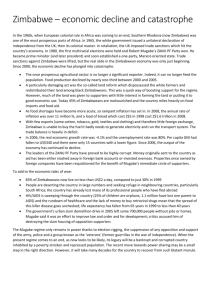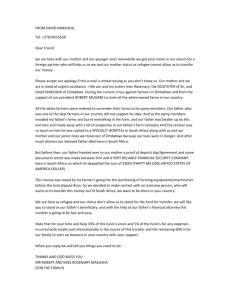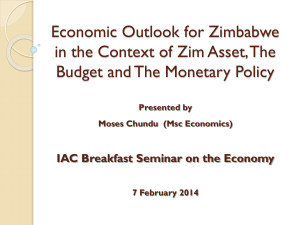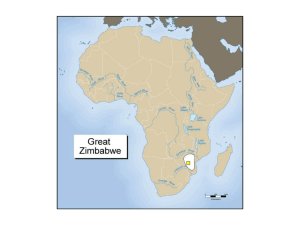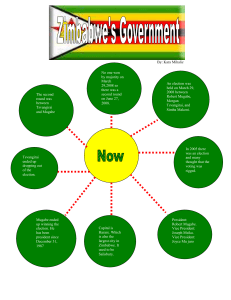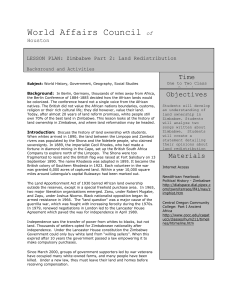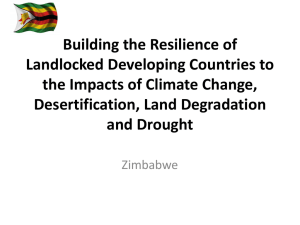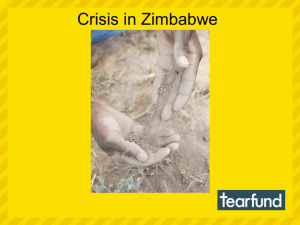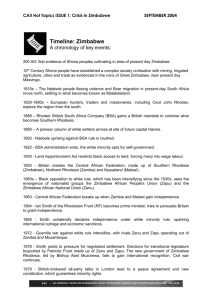Original Message
advertisement
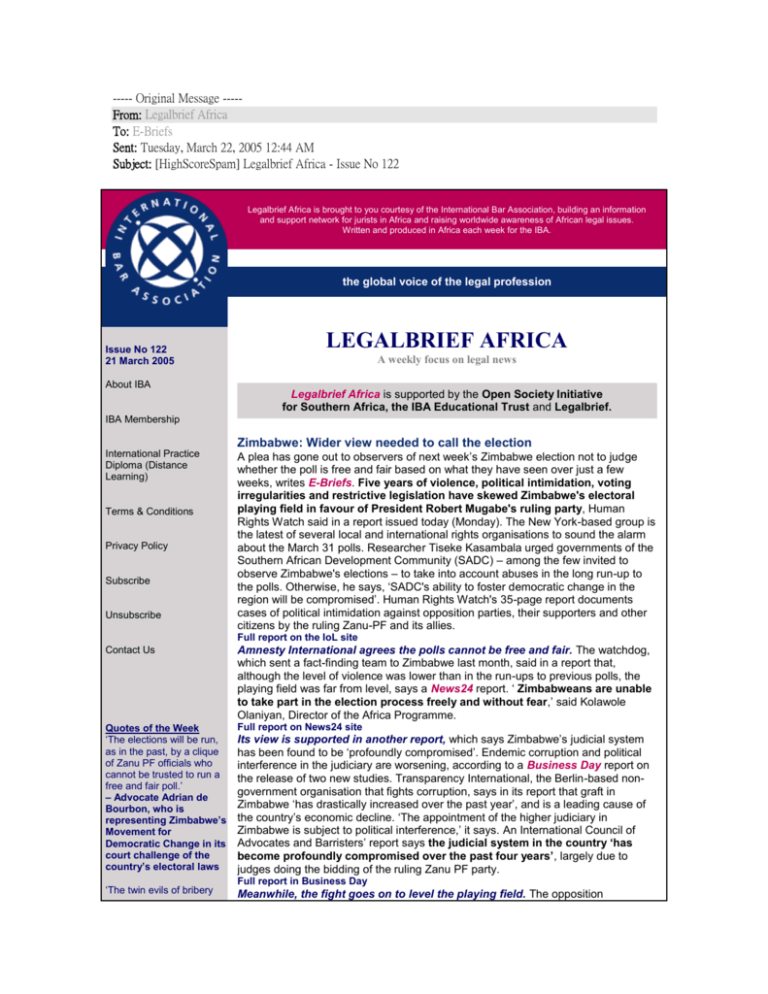
----- Original Message ----From: Legalbrief Africa To: E-Briefs Sent: Tuesday, March 22, 2005 12:44 AM Subject: [HighScoreSpam] Legalbrief Africa - Issue No 122 Legalbrief Africa is brought to you courtesy of the International Bar Association, building an information and support network for jurists in Africa and raising worldwide awareness of African legal issues. Written and produced in Africa each week for the IBA. the global voice of the legal profession Issue No 122 21 March 2005 About IBA LEGALBRIEF AFRICA A weekly focus on legal news Legalbrief Africa is supported by the Open Society Initiative for Southern Africa, the IBA Educational Trust and Legalbrief. IBA Membership Zimbabwe: Wider view needed to call the election International Practice Diploma (Distance Learning) Terms & Conditions Privacy Policy Subscribe Unsubscribe A plea has gone out to observers of next week’s Zimbabwe election not to judge whether the poll is free and fair based on what they have seen over just a few weeks, writes E-Briefs. Five years of violence, political intimidation, voting irregularities and restrictive legislation have skewed Zimbabwe's electoral playing field in favour of President Robert Mugabe's ruling party, Human Rights Watch said in a report issued today (Monday). The New York-based group is the latest of several local and international rights organisations to sound the alarm about the March 31 polls. Researcher Tiseke Kasambala urged governments of the Southern African Development Community (SADC) – among the few invited to observe Zimbabwe's elections – to take into account abuses in the long run-up to the polls. Otherwise, he says, ‘SADC's ability to foster democratic change in the region will be compromised’. Human Rights Watch's 35-page report documents cases of political intimidation against opposition parties, their supporters and other citizens by the ruling Zanu-PF and its allies. Full report on the IoL site Contact Us Amnesty International agrees the polls cannot be free and fair. The watchdog, which sent a fact-finding team to Zimbabwe last month, said in a report that, although the level of violence was lower than in the run-ups to previous polls, the playing field was far from level, says a News24 report. ‘ Zimbabweans are unable to take part in the election process freely and without fear,’ said Kolawole Olaniyan, Director of the Africa Programme. Quotes of the Week ‘The elections will be run, as in the past, by a clique of Zanu PF officials who cannot be trusted to run a free and fair poll.’ – Advocate Adrian de Bourbon, who is representing Zimbabwe’s Movement for Democratic Change in its court challenge of the country’s electoral laws Full report on News24 site ‘The twin evils of bribery Its view is supported in another report, which says Zimbabwe’s judicial system has been found to be ‘profoundly compromised’. Endemic corruption and political interference in the judiciary are worsening, according to a Business Day report on the release of two new studies. Transparency International, the Berlin-based nongovernment organisation that fights corruption, says in its report that graft in Zimbabwe ‘has drastically increased over the past year’, and is a leading cause of the country’s economic decline. ‘The appointment of the higher judiciary in Zimbabwe is subject to political interference,’ it says. An International Council of Advocates and Barristers’ report says the judicial system in the country ‘has become profoundly compromised over the past four years’, largely due to judges doing the bidding of the ruling Zanu PF party. Full report in Business Day Meanwhile, the fight goes on to level the playing field. The opposition and corruption have become the order of the day in the country.’ – Swaziland Minister of Finance Majozi Sithole Movement for Democratic Change is instigating a court action in a last ditch attempt to overhaul the electoral laws. The MDC, reports Zim Online, has filed an application in the High Court demanding that all structures set up by the Zimbabwe Electoral Commission, established under the new laws and tasked with running elections in Zimbabwe, be declared ‘null and void’. The MDC says President ‘Today he r apes, tomorrow Robert Mugabe has militarised key electoral bodies to secure victory at the he is sitting in jail eating my polls and that the commission, whose members were appointed by Mugabe, lacks sufficient clout to make independent decisions. It also charges that most of the money. It is painful to me as taxpayer (that) I have to officials manning the commission were not appointed in time and are nominally feed the bliksem employed by the election body in violation of the electoral law. (scoundrel).’ – Namibian Prisons Deputy Minister Jeremiah Nambinga, arguing in the National Assembly for the reinstatement of the death penalty ‘What they have done is to bring my underpants out to the general public.’ – Former Zambian president Frederick Chiluba, commenting on a police raid in Lusaka where his clothes and shoes were seized from a warehouse ‘Mozambicans are tired of crimes without criminals, thefts without thieves, murders without murderers.’ – Mozambican opposition MP Rui de Sousa’s response to the Attorney-General’s annual report, which came in for heated criticism The views expressed in this newsletter are a reflection of those contained in the original reports to which they are linked here, and are not necessarily those of the International Bar Association. Full report by Zim Online There is bad news for Zimbabweans living in exile. The Supreme Court has dismissed their application to be allowed to vote in the election. Chief Justice Godfrey Chidyausiku, sitting with two other judges, Vernanda Ziyambi and Luke Malaba, did not give full reasons why the application was denied, only saying the highest court in the land had ‘unanimously concluded that the application has no merit and is hereby dismissed’, reports Zim Online. Chidyausiku said he would release details of the judgment in due course. The action was brought by a group of seven Zimbabweans living outside the country, known as the Diaspora Vote Action Group. They had argued the government had breached their constitutionally guaranteed right to vote by refusing to allow them to participate in the election. Full report by Zim Online Jailed opposition MP Roy Bennet will be able to stand for re-election. Zim Online reports Zimbabwe’s new Electoral Court made this surprising ruling last week. The court said Bennett could stand for re-election in parliamentary polls, and postponed the vote in his constituency to April 30 to make it possible. Also last week, the High Court upheld the 12-month jail sentence imposed on Bennett, of the MDC, after parliamentary colleagues found him guilty of assaulting a Minister during a debate. But the Electoral Court, part of a package of political reforms that President Robert Mugabe’s government has implemented in the run-up to the elections, upheld an appeal by Bennett. However, President Robert Mugabe is reportedly upset with the court’s decision and has said it will be appealed. Full report by Zim Online Constitutional lawyers and the opposition have slammed Mugabe on the issue. He said the ruling was ‘madness’ and urged his party to ignore the ruling. University of Zimbabwe constitutional law lecturer, Lovemore Madhuku, said Mugabe’s utterances were inflammatory and disrespectful of the courts, reports Zim Online. ‘ Mugabe was not a party to the court application so why is he interfering with court decisions which do not involve him directly?’ Harare lawyer Stenford Moyo warned that use of intemperate language against judges and the courts ‘may undermine the independence and authority of the judiciary’. Full report by Zim Online In a new twist, Police have accused the MDC of training its youth members to disrupt the polls, claiming five MDC youths have surrendered and are assisting with investigations into training they received in South Africa to handle explosives. ‘The MDC wanted to commit acts of violence so that Zanu PF and the government of Zimbabwe would be viewed as the perpetrators of that violence,’ Assistant Commissioner Boysen Matema, of the police law and order section, is quoted as saying in a report in The Witness. However, the MDC has strongly denied the report, first published in the government-run newspaper, the Sunday Mail. Full report in The Witness Legalbrief Africa welcomes introductions to its weekly news service. Please forward the newsletter to other interested parties or invite others to subscribe by e-mailing a request to africa@legalbrief.co.za Rwanda: Former leader jailed for genocide The UN International Criminal Tribunal for Rwanda has sentenced former Rwandan civic leader, Vincent Rutaganira (60), to six years in prison after he pleaded guilty to involvement in the 1994 genocide in Rwanda. Rutaganira is the fourth man to have pleaded guilty to genocide before the tribunal. Former Rwandan Prime Minister Jean Kambanda was the first to plead guilty before the tribunal, reports IRIN. He is serving a life sentence in Mali. Rutaganira will serve only three years of his sentence as he has already been in prison for three years. In terms of the deal reached with prosecutors, Rutaganira acknowledged full culpability for the deaths of thousands of Tutsi civilians who took refuge at Mubuga Church in Kibuye in April 1994. He admitted that he took no action to protect the Tutsi refugees in the commune where he was a government official during the genocide. Full IRIN report An official says at least 761 000 people should stand trial for their role in the country's 1994 genocide. Secretary General of the Rwandan Justice Ministry General Johnston Busingye claimed that nearly a 10th of the 8.2 million population had been identified as having a role in the 100 days of violence in which more than 500 000 minority Tutsis and Hutu moderates died, reports The Guardian. Some 63 000 suspects are already being held after an inquiry by community-based courts. Full report in The Guardian N igeria: Judge fights his dismissal in court A former High Court Judge, Chrys Selong, last week began his case against President Olusegun Obasanjo and the National Judicial Council, reports THISDAY. Senlong said he was dismissed as a judge without being given an opportunity to defend himself. His axing followed allegations that he had tried to influence the decision of the defunct Akwa Ibom State Legislative Houses and Governorship Election Petition Tribunal. Full report in THISDAY South Africa: Fraud MPs will keep their seats The five South African MPs found guilty of defrauding Parliament will not lose their seats. According to section 47(1)(e) of the Constitution, MPs would have to be convicted and sentenced to more than 12 months imprisonment without the option of a fine, before being considered unfit for office. The five were convicted of defrauding Parliament of various amounts in the Cape Town Regional Court. Magistrate Johnny Vermeulen handed down sentences ranging from R40 000, or one year's direct imprisonment, to R80 000, or three years' imprisonment, as part of a plea agreement. The MPs are the first of 23 MPs implicated in the multimillion-rand travel-voucher scandal to be convicted. Vermeulen said the sentences were ‘fair and just’. Full I-Net Bridge report on Mail & Guardian Online site Mozambique: AG attacked for shoddy report Attorney-General Joaquim Madeira has come under fire in Parliament over his annual report which failed to mention any specific cases of crimes investigated, or criminals prosecuted. Frelimo deputies were irritated by Madeira's veiled suggestion that this kind of report ought to be abolished. ‘The people have the right to know about the situation of the legal system in Mozambique’, said Acucena Duarte, who is a former Deputy Minister of Justice, reports Agencia de Informacao de Mocambique. Duarte attacked the slowness shown by the country's legal institutions at every stage – in investigating cases, in bringing them to trial, and even in delivering sentence. She also questioned what was happening with the case of the country's most notorious assassin, Anibal dos Santos Junior, the leader of the death squad that murdered investigative journalist Carlos Cardoso in 2000. Full report by Agencia de Informacao de Mocambique In a bid to justify his report, Madeira said the Constitution no longer defined his office as ‘a central state body’ but as ‘the supreme body of the public prosecutor's office’. As he no longer headed a ‘central state body’, Madeira said he was no longer able to comment on what happened in the courts, or in the police, but should deal only with the responsibilities of public prosecutors, reports Agencia de Informacao de Mocambique. Full report by Agencia de Informacao de Mocambique Zimbabwe: Media takes on restrictive law Several Zimbabwe media groups have filed an application, at the African Commission on Human and People’s Rights, against Harare’s Access to Information and Protection of Privacy Act. The commission will hold its 37th session in The Gambia between April 27 and May 11, reports Zim Online. In papers filed with the commission, the applicants argue that compulsory registration of journalists as is required under Zimbabwe’s press law infringed on freedom of expression upheld by the continental charter on human rights to which Harare is a signatory. Full Zim Online report Concerns about the judiciary’s independence are evident in a Media Institute of Southern Africa (Misa) statement. Misa refers to a recent Supreme Court judgment that upheld certain sections of the Act as constitutional. The challenge was brought by Associated Newspapers of Zimbabwe and judgment was delivered a year after the case was heard. Although the Supreme Court set aside the determination of the Media and Information Commission in which it refused ANZ registration as a mass media service provider, the fact that the same court referred the issue back to the MIC for consideration was cause for concern, said Misa. It said the ruling upholding the Privacy Act undermined freedom of expression in Zimbabwe. Full Misa statement on Legalbrief site Kenya: Mau Mau to remain banned The High Court has thrown out a legal challenge by members of the Mau Mau who were asking for sections of the Societies Act, which declared the organisation banned, to be repealed. High Court judges Joseph Nyamu, Mohammed Ibrahim and Milton Makhandia upheld the state's objection that the court did not have jurisdiction to grant the plea and other demands, reports The Nation. Full report in The Nation Visit the LEGALBRIEF AFRICA Web site at http://www.legalbrief.co.za/index.php?page=Legalbrief_Africa for archived reports and newsletters. Kenya: Law Society vows to continue action against AG The legal row between the Kenya Law Society and Attorney-General Amos Wako is showing no signs of abating after the LSK said it would institute fresh legal proceedings against Vice-President Moody Awori and the AG over the Anglo Leasing finance scandal. LSK chairman Ahmednasir Abdullahi said Wako’s move to throw out the case had not put a lid on the matter, reports the East African Standard. He said LSK would not be cowed by the AG’s powers over matters of public interest. ‘The move by the AG to enter the nolle prosequi has not killed our case. Our case is still strong to withstand any test in judicial affairs,’ said Abdullahi. Full report in the East African Standard The Law Society’s case questioning the powers of the AG to terminate criminal proceedings against himself has now been referred to the Chief Justice. Justice Mohamed Ibrahim, reports the East African Standard, certified the application as urgent and directed that the file be placed before Justice Evan Gicheru for further directions. Full report in the East African Standard Namibia: Recount of votes confirms Swapo victory A High Court-ordered recount of votes of November's parliamentary election has confirmed that Namibia's ruling Swapo party secured 75% of the total vote, says an SABC News report. Officials announcing the results said there would be no change in the allocation of parliamentary seats following the recount. Namibia's High Court this month ordered ballots recounted following opposition allegations of irregularities. Full SABC News report Sudan: African solution proposed for Darfur N igeria, in a bid to end the impasse in the UN Security Council over a new resolution for Sudan, has proposed that an African-run tribunal be established to hear cases of alleged war crimes in the Darfur region. BBC News reports the US opposes calls for war crimes suspects to be tried at the International Criminal Court (ICC), which European countries favour. It is believed that more than 100 000 have died and two million have fled their homes in the two-year conflict. ‘We welcome the general principle that African solutions are required for African problems,’ said Richard Grenell, spokesman for the US mission to the UN. Full BBC News report Botswana: Now professor faces defamation suit A university professor who is facing deportation after writing a critical paper on the government is now being sued for defamation. Professor Kenneth Good's lawyers say, however, that the lawsuit by Botswana Democratic Party Secretary General, Daniel 'DK' Kwelagobe, was obviously an attempt by the state to divide Good's attention by opening many battle fronts, says The Reporter. Full report in The Reporter Namibia: Appeal judge to go on trial for child r ape Supreme Court Judge of Appeal Pio Teek, who is accused of abducting and s exually m olesting two girls aged nine and 10 in Windhoek, has appeared again in the Windhoek Magistrates’ Court, reports The Namibian. Teek will be arraigned in the High Court, where he must appear on April 19. The indictment lists eight charges against the embattled Judge of Appeal. These include two counts of r ape, two charges of abduction, two counts of committing an indecent or immoral act with a child under the age of 16, and two counts of using ‘means to stupefy a female for unlawful carnal in tercourse’ or supplying liquor to a person under the age of 18. Teek has not yet been given an opportunity to plead to the charges. Full report in The Namibian Burundi: Electoral Code adopted The National Assembly has voted in favour of adopting a new electoral code. The code will now be tabled before the Senate, the other chamber of the Burundian parliament, for adoption. It will then be sent to the head of state to be signed into law, reports IRIN. The electoral system covered by the code will regulate ethnic balance in the appointment of communal administrators, who govern communes in rural areas. No ethnic group will be allowed to have more than 67 of the 117 available communal-administrator posts. Full IRIN report Zambia: Charges laid against Chiluba in UK Zambia’s Government has filed fresh charges against Frederick Chiluba – this time in a British High Court – alleging the former president, along with a Congolese businessman, defrauded the state of almost $35m and sent the money abroad. The accusations, reports BBC News, refer to an arms deal which was initiated during Chiluba's term in office five years ago. Chiluba denies the allegations, saying they are politically motivated. Similar charges were brought against him in a court in Zambia last year, but were later dropped after two other people involved in the case fled the country. Full BBC News report Uganda: Rebel leaders urge ICC to hold their warrants Leaders from war-torn northern Uganda went to The Hague, Netherlands, last week to appeal to the International Criminal Court (ICC) to refrain from issuing arrest warrants against the leaders of the rebel Lord's Resistance Army (LRA). ‘The purpose of the visit is to meet the Chief Prosecutor and let him know that (the) ICC's intervention in northern Uganda will seriously jeopardise efforts to end the conflict through peaceful means,’ IRIN quoted a source as saying. Recently, the ICC announced plans to issue arrest warrants for LRA commander-in-chief, Joseph Kony, and several other high-ranking rebels. The move has met with vehement opposition from several local leaders and human rights groups, who argue that such a step would only serve to heighten hostilities and hinder ongoing peace negotiations between the government and the rebels. Full IRIN report Malawi: Journalists out on bail after ghost story Two Malawian journalists, arrested and charged with publishing false information for reporting that President Bingu wa Mutharika had moved out of a palace because he feared it was haunted, have been granted bail. A Mail & Guardian Online report says Raphael Tenthani, who works for the BBC and Mabvuto Banda, a journalist for The Nation newspaper and who also reports for Reuters news agency, were arrested by armed police at their homes in Blantyre last week. A third person, Horace Nyaka, an aide to Vice President Cassim Chilumpha, was also arrested and charged with the same offence. He, too, was released on bail. Full report on Mail & Guardian Online site Legislation under Review Uganda: Defence Bill slammed by women’s groups The Uganda People's Defence Forces Bill is causing an uproar among women groups in the country. At the centre of the row, reports The Monitor, is a clause which says female recruits should be allowed to fall pregnant only four years after being recruited into the national army. The Bill also stipulates a three-year interval between pregnancies, failing which a female recruit can be dismissed. Women groups have warned that they will sue the government if Parliament passes the Bill. Full report in The Monitor Kenya: Numbers needed to carry no-confidence vote increased MPs have agreed to amend the controversial Keter Bill to make it difficult to remove a sitting Head of State. In a bid to appease opponents of the Bill that primarily gives Parliament autonomy from the Executive, reports the East African Standard, MPs drawn from various political parties announced they had agreed to introduce amendments that would raise from a simple majority to two-thirds of the total MPs required to pass a no-confidence vote against the government. Full report in the East African Standard N igeria: Law a turn-off for investors, says president President Olusegun Obasanjo has rejected the amended Bill on Privatisation and Commerc ialisation, saying the change introduced by the National Assembly would scare away investors. On the sections which provide that an Act of the National Assembly shall be required to amend the law establishing a privatised and commerc ialised enterprise, the president said ‘this requirement will inevitably discourage and scare away investors from participating in the privatisation exercise due to the inherent risk it poses’. Full report in Vanguard Swaziland: Anti-Graft Bill to be tabled The Justice Ministry is to table an Anti-Corruption Bill in the next few weeks. It has been estimated that the government was losing more than US$6.5m a month to corrupt practice, reports IRIN. ‘Some highly placed individuals connive with government officials to inflate contracts, or even make government pay for services that were never rendered. The playground for corruption is in goods and services, as well as construction projects,’ said Finance Minister Majozi Sithole. An AntiCorruption Unit established in 1998 has not produced a single indictment because legislation giving the unit the powers it needs to investigate and bring cases against suspects has not been enacted. Full report in IRIN Uganda: U-turn on Constitutional Amendment Following much criticism, the Cabinet has agreed to revise the controversial omnibus Constitutional Amendment Bill. MPs and the judiciary questioned its legality and the way it was presented, reports New Vision. They argued that the Bill should be split. ‘ It will remain one Bill but it is going to be divided into three parts,’ said a Cabinet source. ‘Articles that will require referendum and district council approval will be put separately from those that are to be approved by Parliament,’ another source said. The Bill has sparked controversy because it aims to remove a clause limiting presidential terms. Full report in New Vision Judgments available Online Abuja Supreme Court: Savannah Bank of N igeria v Oladipo Opanubi, July 9, 2004. The Supreme Court overturned an Appeal Court ruling in favour of the respondent, a lawyer, who instituted a claim for quantum merit after his contract with the appellant was cancelled. Full judgment in THISDAY Nairobi High Court: Chelanga v Juma. Probate and Administration Case No. 2258 of 1996. Under Islamic law an illegitimate child does not inherit the estate of her father but is permitted to inherit from her mother. The Court was of the view that it was not enough to show that the deceased supported the children during his lifetime. Full judgment in The Nation INTERNATIONAL BAR ASSOCIATION 271 Regent Street, London W1B 2AQ, United Kingdom Tel: +44 (0)20 7629 1206 | Fax: +44 (0)20 7409 0456
